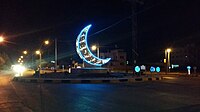Suhur

| Part of a series on |
| Meals |
|---|
 |
| Meals |
| Components and courses |
| Related concepts |
Suhur, Sahur, or Suhoor (UK: /səˈhɜːr/;[1] Arabic: سحور, romanized: suḥūr, lit. 'of the dawn', 'pre-dawn meal'), also called Sahari, Sahri, or Sehri (Persian: سحری) is the meal consumed early in the morning by Muslims before fasting (sawm), before dawn during or outside the Islamic month of Ramadan.[2] The meal is eaten before fajr prayer.[3] Suhur corresponds to iftar, the evening meal during Ramadan, replacing the traditional three meals a day (breakfast, lunch, and dinner),[3] although in some places dinner is also consumed after iftar later during the night.
Being the last meal eaten by Muslims before fasting from dawn to sunset during the month of Ramadan, suhur is regarded by Islamic traditions as a benefit of the blessings in that it allows the person fasting to avoid the crankiness or the weakness caused by the fast. According to a hadith in Sahih al-Bukhari, Anas ibn Malik narrated, "The Prophet said, 'take suhur as there is a blessing in it.'"[4]
Musaharati
[edit]The musaharati[5] is a public waker for suhur and dawn prayer during Ramadan.[6][7][8] According to the history books, Bilal ibn Rabah was the first musaharati in Islamic history, as he used to roam the streets and roads throughout the night to wake people up.[9]
The occupation is described by a Damascus musaharati: "My duty during the holy month of Ramadhan is to wake people up in the old city of Damascus for prayers and Suhur meal."[10] According to a Sidon musaharati, the attributes every musaharati should possess are physical fitness and good health, "because he is required to walk long distances every day. He should also have a loud voice and good lungs, as well as an ability to read poems. A musaharati should supplicate God throughout the night to wake the sleepers."[11]
The tradition is practiced in Egypt, Syria, Sudan, Saudi Arabia, Jordan, India, Pakistan, Bangladesh, and Palestine. However, there has been a gradual disappearance of the musaharati due to several factors, including: Muslims staying up later; using technology such as alarm clocks to wake for suhur; and louder and larger homes and cities that make the voice of the musaharati harder to hear.[12] However, the old Dhakaiya tradition of singing qasidas can still be found in the streets of Old Dhaka in Bangladesh.[13]
In Indonesia, a kentongan is used to wake households up to eat the suhur meal.[14]
References
[edit]- ^ "Suhur". Collins English Dictionary. HarperCollins. Retrieved May 15, 2019.
- ^ "Kashmir | History, People, & Conflict". Encyclopedia Britannica. Retrieved 2021-05-08.
- ^ a b BBC - Schools - Religion - Islam, retrieved 11 April 2010
- ^ Bukhari: Book 3: Vol. 31: Hadith 146 (Fasting).
- ^ "Pictures: Celebrating Ramadan Around the World". National Geographic Society. July 19, 2014. Archived from the original on July 20, 2014. Retrieved 10 August 2014.
- ^ Linda Wong (2002). Sentence essentials: a grammar guide. Houghton Mifflin, 2002. p. 100. ISBN 9780618154821.
- ^ Angelo Colorni (2011). Israel for Beginners: A Field Guide for Encountering the Israelis in Their Natural Habitat. Gefen Publishing House Ltd, 2011. p. 84. ISBN 9789652294838.
- ^ Jamāl Ghīṭānī (2009). The Zafarani Files. Translated by Farouk Abdel Wahab. American Univ in my world Cairo Press, 2009. p. 333. ISBN 9789774161902.
- ^ Rima Al-Mukhtar (10 August 2011). "Ramadan Mesaharati". Arab News. Retrieved 10 August 2014.
- ^ HUMMAM SHEIKH ALI (August 19, 2011). "Charm of Ramadhan in Damascus". Xinhua. Brunei Times Sdn Bhd. Archived from the original on 12 August 2014. Retrieved 10 August 2014.
- ^ Vivian Haddad (23 Jul 2014). "The Musaharati, Still Part of Sidon's Ramadan Tradition". Asharq Al-Awsat. Retrieved 10 August 2014.
- ^ Rima Al-Mukhtar (10 August 2011). "Ramadan Musaharati". Arab News. Retrieved 10 August 2014.
- ^ Sirajul Islam. "Qasida". Banglapedia: The National Encyclopedia of Bangladesh, Asiatic Society of Bangladesh, Dhaka. Retrieved 5 May 2018.
- ^ Aman Rochman (20 May 2018). "Malang village children find joy in 'sahur' activity during Ramadhan". The Jakarta Post. Retrieved 17 April 2021.

